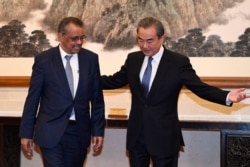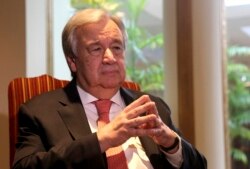Thursday marks 100 days since China notified the World Health Organization that it was dealing with cases of what would later be identified as COVID-19, the deadly virus that has spread to nearly every corner of the world.
U.S. President Donald Trump has accused WHO of being too biased toward China and said that the U.N. health agency should have warned of the approaching crisis months earlier.
"They called it wrong," Trump said Tuesday of the WHO. "They really, they missed the call. They could have called it months earlier. They would have known, and they should have known. And they probably did know, so we'll be looking into that very carefully."
On Wednesday, Secretary of State Mike Pompeo, standing beside Trump, said the organization "hasn't accomplished what it was intended to deliver," and that the United States is "re-evaluating our funding," echoing a threat Trump made earlier in the week.
One of the Trump administration's complaints is the blocking of Taiwan's participation in the WHO.
"We strongly advocate that they be invited by the director-general to participate as an observer, as they have done in the past," a senior administration official said this week.
The strain between the WHO leadership and Taiwan was evident at a news conference on Wednesday, when WHO Director-General Tedros Adhanom Ghebreyesus said he was the subject of a campaign of racist slurs aimed at him from the island state.
"From Taiwan. Taiwan, the Foreign Ministry also knew [of] the campaign," Tedros declared to reporters. "They didn't disassociate themselves. They even started criticizing me in the middle of all those insults and slurs, but I didn't care."
Taiwan's president vehemently rejected the accusation.
"For years, we have been excluded from international organizations, and we know better than anyone else what it feels like to be discriminated against and isolated," Tsai Ing-wen said in a statement Thursday.
China-centric?
The United States is the largest donor to the WHO. Washington's 2020 assessed contribution is $59 million, and it gives hundreds of millions more in voluntary contributions to specific programs. China's assessed WHO contribution this year is about $30 million, and in the past it has voluntarily given about $10 million more, leaving some analysts to wonder if its influence is outsized.
"I think that there is both a legitimate concern here about the WHO perhaps pandering to China — there is some evidence of that, although it's to be determined, we don't really know," said Robert Daly of the Wilson Center's Kissinger Institute on China and the United States. "And then there's also a concern that perhaps the Trump administration is using this as a scapegoat to distract from its own rather late and ineffectual response."
Experts worry the U.S. holding back funding in the middle of a global pandemic could be harmful.
"Now is not the time to cut off funding," Brett Schaefer of the conservative Washington, D.C.-based The Heritage Foundation said in a statement. "Instead, the U.S. should condition future funding to the approval and completion of an investigation."
Others question what a harsh stance on Beijing by the WHO would accomplish.
"It's also worth asking, would it really have been a smart strategy for the WHO to massively alienate China in January, when details of the disease were still only emerging?" asked Richard Gowan, U.N. director for the International Crisis Group. "Would it really have led to a more effective international response if WHO-China relations broke down at an early stage in the crisis? I rather doubt it."
Trump's shifting mood on Beijing
Trump has taken aim at China repeatedly as the coronavirus outbreak has spread in the United States. He has also expressed annoyance with the WHO for not supporting his January 31 decision to restrict some travel from China to the U.S.
But in the weeks before the virus shut down the economy and sickened scores in the U.S., he praised both President Xi Jinping's efforts to contain the virus in China and the work of the WHO.
"I don't think you should look for a consistent line from Trump. I think that he continues to say whatever is best for him," said Gowan. "The risk is that he will now take some valid criticisms of the WHO, but then magnify those 10-fold or 1,000-fold, and use bashing the WHO as his latest rallying cry as he trundles toward the elections."
Timeline
On January 7, Chinese authorities identified the novel coronavirus as the cause of the illnesses it was seeing. Two weeks later, the WHO convened its Emergency Committee, which deemed it too early to declare the outbreak a public health emergency of international concern; that move came a week later on January 30.
"Make no mistake," WHO chief Tedros said at the time. "This is an emergency in China, but it has not yet become a global health emergency. It may yet become one."
At the time, Tedros also praised Beijing for its response.
"China's efforts to contain the outbreak at the epicenter have been essential for preventing the further spread of the virus," he said. "China identified the pathogen in record time and shared it immediately, which led to the rapid development of diagnostic tools."
On March 11, as the virus began sickening people in more countries, the WHO elevated classification of the situation to a pandemic.
Two days later, the Trump administration proclaimed it a national emergency.
Beijing has rejected criticism of its handling of the health crisis.
"China has been open, transparent and responsible since the COVID-19 first broke out," Chinese Foreign Ministry spokesman Zhao Lijian said Wednesday. "We notified the WHO of the epidemic, shared the genome sequencing of the virus, carried out international cooperation and helped other countries affected, all at the earliest time possible. These are plain, internationally recognized facts, which cannot be denied or erased by anyone."
U.N. Secretary-General Antonio Guterres threw his support behind the WHO this week, as it came under attack from the White House.
"It is my belief that the World Health Organization must be supported, as it is absolutely critical to the world's efforts to win the war against Covid-19," Guterres said in a statement.
He emphasized that the virus is "unprecedented in our lifetime" and requires an unprecedented response.
"Obviously, in such conditions, it is possible that the same facts have had different readings by different entities," he said. He called for a review after the crisis has passed.
"Now is the time for unity, for the international community to work together in solidarity to stop this virus and its shattering consequences," Guterres said.
Patsy Widakuswara, Nike Ching, and Lisa Schlein contributed to this report.








